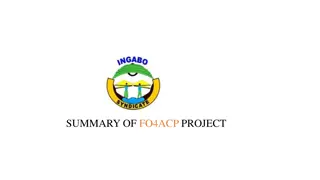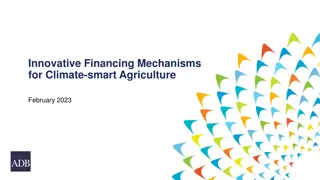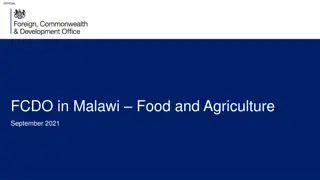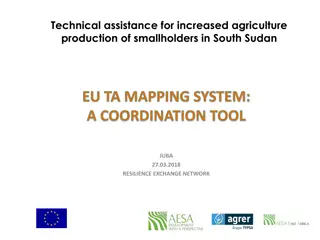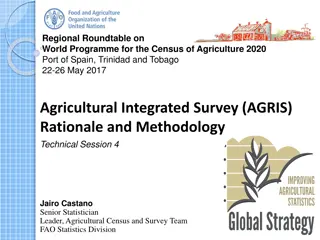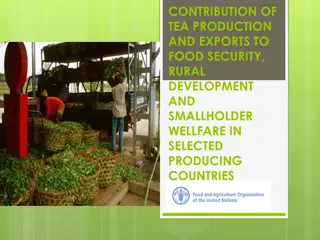Enhancing Livelihoods through FO4ACP Programme
Farmers Organizations for Africa, Caribbean and Pacific (FO4ACP) aims to uplift smallholders and family farmers in various countries by strengthening regional, national, and local farmers organizations. The program components include economic service provision, capacity building, policy influence, a
0 views • 11 slides
ADB's Innovative Financing for Climate-Smart Agriculture
ADB is committed to financing climate-smart agriculture through innovative mechanisms to address the climate change-food-nature nexus. They aim to stimulate private sector participation, support policy reforms, and develop carbon markets sensitive to smallholders. With ambitious financing goals, ADB
1 views • 10 slides
Official FCDO Priorities in Malawi's Food and Agriculture Sector
Food and agriculture priorities in Malawi focus on climate-smart agriculture, food security, responsible investment, land governance, business practices, productivity, emissions reduction, food safety, nutrition, and economic empowerment. Efforts include supporting UN's PROSPER program, building res
0 views • 5 slides
Technical Assistance for Increased Agriculture Production of Smallholders in South Sudan
The project aims to enhance agriculture production among smallholders in South Sudan through effective coordination, monitoring of projects, and ensuring overall coherence of rural development programs. Critical issues include lack of clear baseline data and discrepancies in data collection methods.
0 views • 7 slides
Strengthening Tea Smallholders Sector: Challenges and Solutions
Tea smallholders play a crucial role in the global tea sector, facing challenges like price realization and quality standards. Efforts such as the Confederation of International Tea Smallholders (CITS) aim to address these issues by providing a platform for policy development, market access, communi
0 views • 12 slides
Understanding Farmer Organizations and Smallholder Farmers in Agroecology
Exploring various types of farmer organizations, their purposes, and impacts on smallholder farmers in agroecology. A discussion on organizational forms, interventions, challenges faced by smallholders, and the importance of collaboration in achieving collective benefits.
0 views • 15 slides
Regional Roundtable on World Programme for the Census of Agriculture 2020
There is a pressing need for improved agricultural data, particularly in the context of SDG indicators and global statistics. The Agricultural Integrated Survey (AGRIS) offers a comprehensive solution with a 10-year farm-level integrated survey approach, providing essential data for policy-making, m
0 views • 19 slides
Understanding Contract Farming and Public-Private Partnership in Agriculture
Indian agriculture, dominated by smallholders, faces challenges such as weak market linkages and low surplus. Contract farming emerges as a solution, benefiting both farmers and sponsors. Historical milestones and types of contract farming models are explored, highlighting the benefits and nuances o
0 views • 11 slides
Addressing the Challenges of Aflatoxin: The NASFAM Case Study
NASFAM, a smallholder farmers' association in Malawi, faces significant challenges with aflatoxin contamination impacting food security, trade, and market access. This presentation outlines NASFAM's history, the impact of aflatoxin on smallholders, trade implications, market regulations, and NASFAM'
0 views • 13 slides
Factors Influencing Landscape Practice: A Comprehensive Overview
Factors impacting landscape practices are diverse, spanning economic, political, social, and environmental realms. Issues such as market pressures on smallholders, governmental policies, cultural perceptions, and ecosystem health all play crucial roles in shaping landscape management decisions. Unde
0 views • 9 slides
Tea Production and Exports Contributions to Food Security and Rural Development
Tea production and exports play a significant role in food security, rural development, and smallholder welfare in selected producing countries such as India, Kenya, and Sri Lanka. The earnings from tea exports contribute to income growth, foreign exchange, employment, and national economic growth.
0 views • 23 slides
